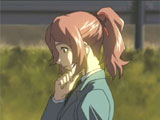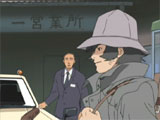

Quick Links:
Kaze no Yojimbo, Volume 1: A New Face in Town
There's always an inherent risk with doing a modern telling of an old beloved tale. If you make it too much like the original, you're bound to draw criticism that your story is both unfitting of modern times and not as good as the original. If the adaptation differs too much from the source material, the audience may be lost on your purpose for adapting the work. Based on Akira Kurosawa's 1961 hit, Yojimbo ("youjinbou" means "bodyguard"), Kaze no Yojimbo successfully strikes a balance between the two extremes - telling a tale that incorporates core values from Kurosawa's film, while offering new spins in style and plot to keep the story fresh.
The original story is about a wandering swordsman (!) named Sanjuro, who witnesses a young farmer flee his home to join the gang war in a nearby town. Sensing an end to his boredom, he enters the town and decides to involve himself in the fun, much to the chagrin of the barman Gonji. Hilarity ensues as both gangs offer ever-increasing pay to Sanjuro to join them as a bodyguard, until his weak spot gets the better of him.
Kaze no Yojimbo is about a wanderer from Tokyo named George Kodama, who enters the town of Kimujuku looking for a locomotive engineer named Genzo Araki, of whom he wants to ask a question. He asks an officer about Araki, and the officer refers him to an elderly bartender, who feigns ignorance about Araki and refers George to the Araki Hotel for a place to stay the night. (One of the early jokes is that half the town is named Araki.) After a couple skirmishes with locals who are less than hospitable, George decides to stick around and enjoy the field day that is the town.
Part of the fun of this series is identifying elements taken from the original Yojimbo. The old film featured two gangs, run by the rotten scoundrels Seibei and Ushitora. Gonji the bartender despises the gangs and keeps to himself, while the neighboring coffin maker's business is booming. Finally, there's the officer that doesn't take a side in the war, but is quite the instigator. The anime features all of these elements in one way or another: the Ginzame and Tanokura gangs, the old bartender, the officer that stays out of gang business, and the Araki Hotel manager (Sanae Araki) that profits from the gangs.
There are some interesting differences as well. Tanokura's young daughter Miyuki poses as a possible love interest, for example, and there is more to Sanae and the bartender than they let on. The chief difference in the anime adaptation is that it plays out more like a murder mystery than the simple tale of a virtuous samurai. While the characters Sanjuro and George have similar qualities, George is no wanderer. He enters the town with an objective, the details of which aren't revealed at first. Kaze no Yojimbo features classic mystery elements, like characters with dark secrets, mystery gunmen, and strange deaths. The show manages to retain the fun of Kurosawa's film, while keeping one guessing at what will be revealed next.
The product features clean audio and video, and a nice shot of George and Miyuki on the front. Other than that, there's not much to talk about. It's a bit of a surprise that there were no real extras on the disc, though I don't consider it a disappointment.
I can't say for certain whether Kaze no Yojimbo would have been less entertaining without having seen the older film, but it definitely seems that way. The detective show angle certainly is fun, but some elements might seem like they have no relevance if you haven't seen Kurosawa's Yojimbo. Definitely see the film first, if you're interested in this series. The film is excellent, and there'll be more to think about while watching the show. I will be interested to see how George compares to Sanjuro as the show progresses.
Distributor: Bandai Entertainment Creator: Kurosawa Production / Sammy Released: 2001
Video Quality: A Audio Quality: A Presentation: B+ Content: A Overall: A



